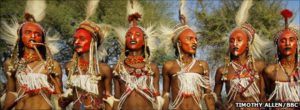by Lilia Leung
September marks the end of the rainy season in West Africa. Some West African nomadic tribes, such as the Tuareg and the Wodaabe, commemorate this event with festivals and rituals. One of these festivals is the Guérewol, a week-long courtship ritual that takes place at particular gathering points in West Africa.
The Woodabe people are a subgroup of the Fulani ethnic group in West Africa. Traditionally, they were cattle-herders and traders in the Sahel region who traveled from pasture to pasture when the season changed. Today, much of their population is in Niger, though they can also be found in Nigeria, Cameroon, Chad, and the Central African Republic. Normally, Woodabe families and clans live in isolation in the desert, but for a week in September, Woodabe clans gather together for the Guérewol festivities at a location that is only disclosed a few days before the event.
The Woodabe are a polygamous people, where both the men and women have sexual freedom and are allowed to pursue new partners. It’s common for both men and women to have multiple marriages, and for many individuals, their first marriage is arranged by their parents. Guérewol is an opportunity for these individuals to seek a second marriage partner based on love.
The main event of the Guérewol is a beauty pageant, but not one that is anything like the beauty pageants we see in the western world. The main difference is that the participants in this West African beauty pageant are men, not women. Woodabe people hold physical beauty in high regard and have strict criteria for what can be considered beautiful, including height, white teeth and eyes, a well-defined nose, and good posture. To prepare for the pageant, the young men take a painstaking amount of time (sometimes up to six hours!) to apply makeup and accessories that accentuate these features. Clay in bright pigments of red, yellow, and white is used to paint their faces, and black eyeliner and black lipstick are used to outline their eyes and lips. Lastly, they put on a traditional dress that shows off their physiques.

Once the pageant begins, the young Woodabe men perform the customary song and dance Yaake as a group in an attempt to impress the young women in attendance. While the winners are officially determined by three female judges, the men are also being evaluated by every young woman in the audience. The ultimate victors win fame amongst the Woodabe clans as well as their choice of a new partner. After the pageant, clan meetings, marriage negotiations, and other social event take place for the remainder of the week.
While the Guérewol is a much-anticipated time of celebration for the Woodabe people, this ritual has actually been occurring less frequently in recent years. Guérewel can only take place when there is enough water in the area to sustain the hundreds of people who will turn up, and the increasing frequency of droughts has forced cancellation of the in drier years. This phenomenon illustrates the importance of water in every aspect of life, from the health and livelihood of people to the preservation of their art and culture. By working to ensure that everyone in Niger has access to plentiful safe water, we may be able to help preserve long-standing customs practiced by the indigenous people of West Africa and bring love back to the desert.
Read more on the Guerewol festival and girl power here.
Resources:


